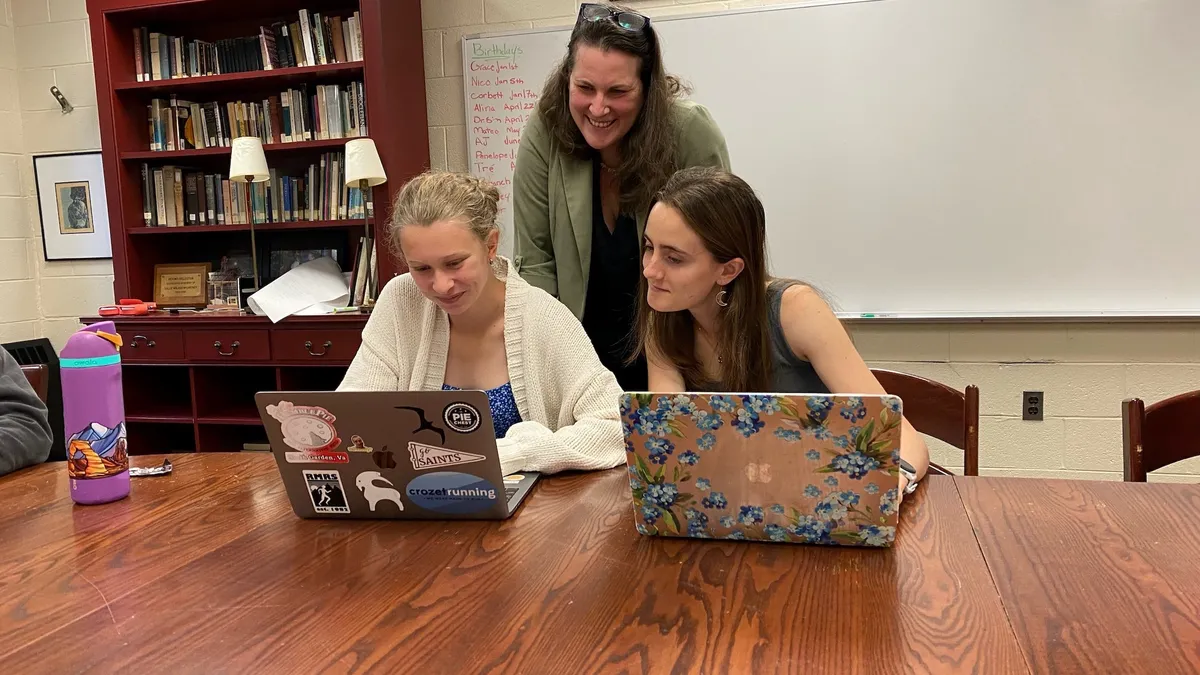As the 2024 U.S. presidential campaign was in full swing and political discourse was ramped up, Chloe Paget-Brown, a 12th grader at St. Anne's-Belfield School in Charlottesville, Virginia, was learning strategies for respectful dialogue around current events as part of a 21st Century Citizenship class.
One of the most challenging — yet vital — aspects of the year-long class so far, Paget-Brown said, has been ensuring classmates who aren't as outspoken have opportunities to be heard during class discussions on contentious topics.
"The people that were really active in the discussion tend to have the strongest opinions, and so in order to compromise, we really had to focus on making sure that everyone was speaking," Paget-Brown said. "Because the people that were kind of more unsure, they honestly sometimes had the most insight, because they were able to see all of the advantages and disadvantages."
St. Anne's-Belfield School is a private, non-denominational pre-K-12 boarding and day school with nearly 1,000 students. The 21st Century Citizenship course is a senior seminar class that highlights the importance of using credible resources to research opinions, understanding and empathizing with differing perspectives, and navigating compromises.
The class is co-led by Laura Robertson, upper school dean of academics, and alumnus Jake Fallica, class of 2020. Robertson explains the course as a project-based, student-driven 12th grade seminar that focuses on U.S. civics and global citizenship. The course begins with a deep dive into the U.S. Constitution. In the coming weeks, students will study and argue the merits of a case that's currently on the U.S. Supreme Court docket.
"The core concepts are around engaging in constructive dialogues about challenging issues, preparing them to go off into the world and make an impact in their new communities, and also to understand and be able to empathize across difference," Robertson said.
As the students began their work this year, they developed "class norms," which include:
- Respect everyone’s right to have an opinion and respect everyone’s intellect.
- Argue against ideas not people.
- Aim to learn through discussion not to win points.
- Be curious, not judgmental.
- Find worth in others’ opinions.
- Allow others to speak and finish their thoughts.
- Open up the conversation and commit to using your participation to help others get into the discussion.
- Create a culture of "calm intensity" when you can.
As far as taking this course during a polarizing presidential campaign, student Kaden Fenno said the timing was beneficial, as moments from the campaign illustrated to students what not to do during political discourse.
"Everyone was honestly a little bit done with hearing the super-polarizing political speaking," Fenno said. "I think most people in our class kind of agreed that the candidates weren't doing the best job, like, actually just talking about the topics."
Another critical lesson the students said they have learned is to participate in civil discourse with the goal of understanding different opinions and perspectives.
"I don't think that necessarily means shifting your opinions," said Cadigan Perriello, also a student in the class. "But by taking a step back and actually trying to formulate where they're coming from, their background, why they believe what they believe, it's a lot easier to empathize with them, and maybe then to show them where you're coming from."
Perriello also said another helpful skill she's learned from the class is the ability to leave debates behind when class ends. "I think it's really important to have those discussions, and they have a lot of value in them, but also viewing the other people as human beings who have a life outside of their opinions" is important, she said.











